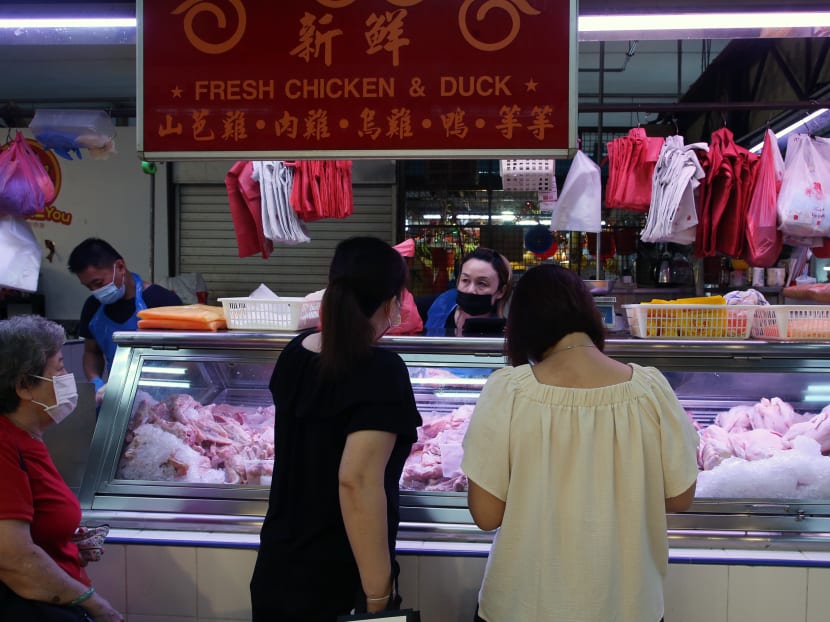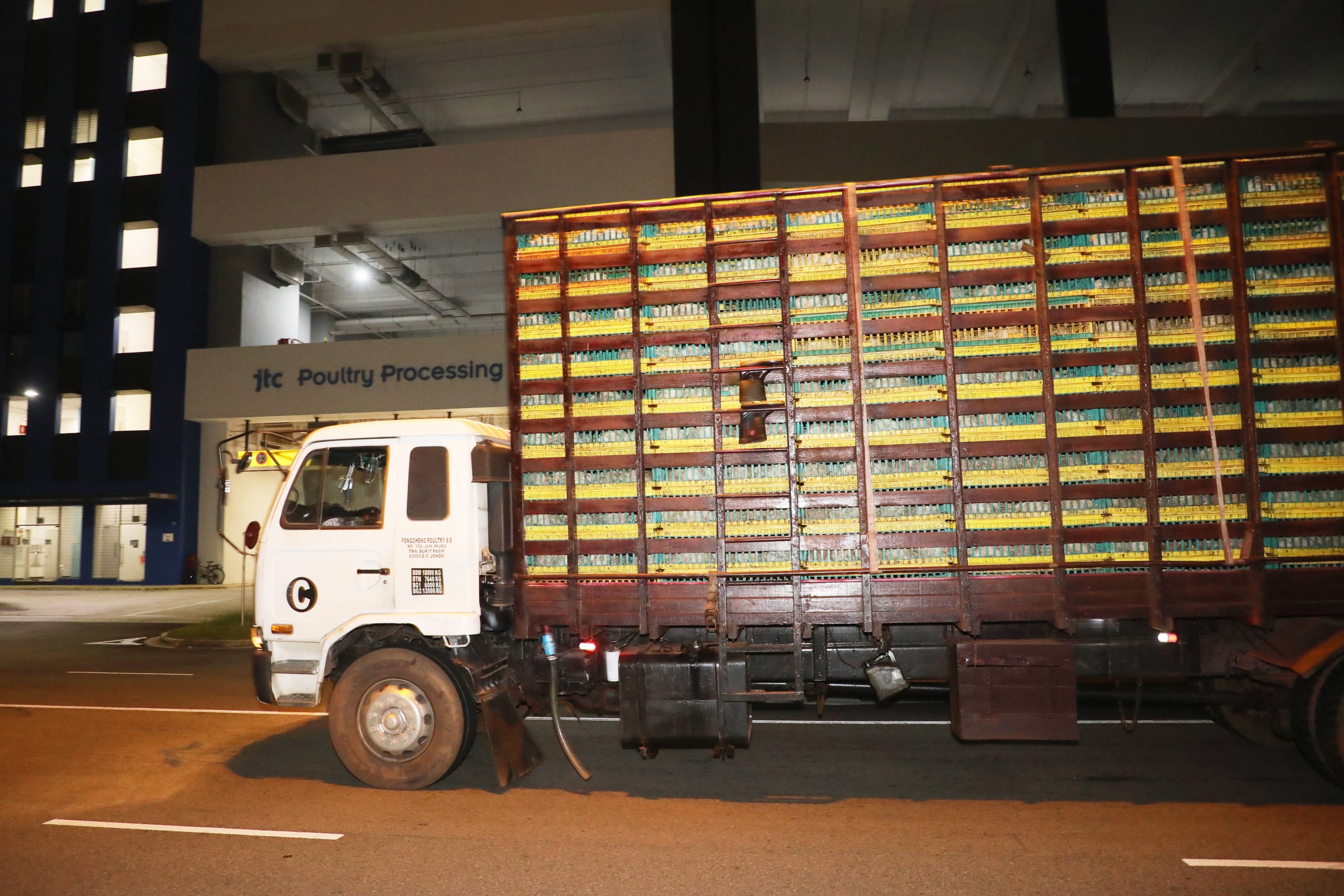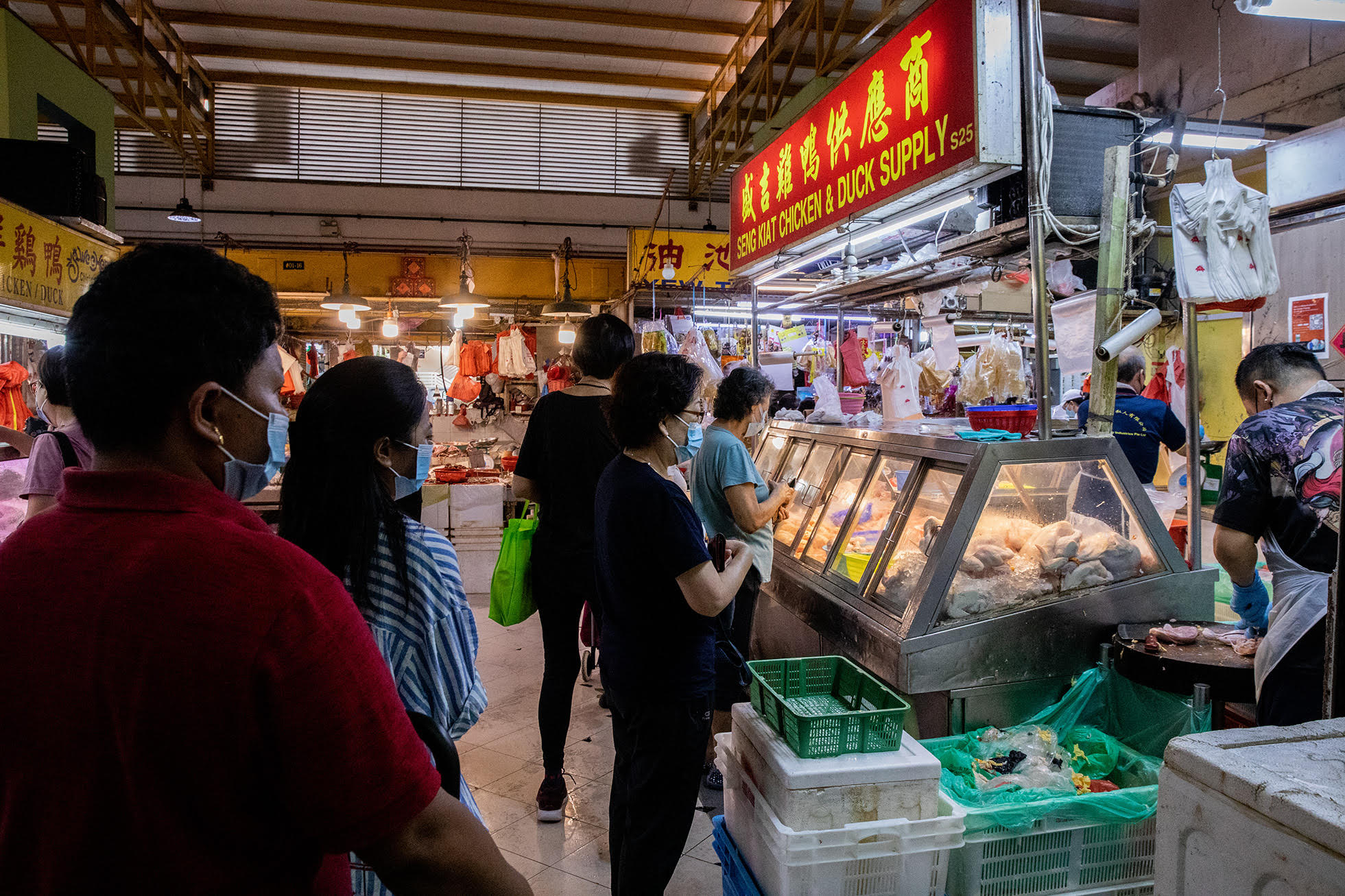Supplies of fresh chickens at wet markets may not last the week, say sellers
SINGAPORE — Customers who visit wet markets over the next week will see dwindling supplies of fresh chickens and can expect to pay higher prices for them, following Malaysia’s export ban of the poultry which kicks in on Wednesday (June 1).

Customers buying chicken from a stall selling fresh poultry at a wet market in Vista Point, Woodlands.
- At wet markets, customers can expect to pay higher prices for fresh chickens, some sellers said
- That is if there are enough fresh chickens to be sold
- Importer Kee Song Food said it has stockpiled up to 10 days of fresh chickens that are frozen, to be disbursed to its clients
- Some F&B businesses said they have switched to frozen imports and have raised prices
SINGAPORE — Customers who visit wet markets over the next week will see dwindling supplies of fresh chickens and can expect to pay higher prices for them, following Malaysia’s export ban of the poultry that kicks in on Wednesday (June 1).
Some chicken sellers told TODAY that their supplies may not even last the week, while food-and-beverage (F&B) operators said that they have stockpiled and even switched to frozen alternatives — although some, too, have raised prices.
Mr James Sim, head of business development at importer Kee Song Food, said that it has stockpiled up to 10 days of fresh chickens that were frozen in Singapore to be disbursed to its clients, which include online retailers, supermarket chains, restaurant groups, wet markets and chicken rice stalls.
Businesses, especially those that mainly offer chicken, will be given priority.
“Most of our stockpile has been allocated to them because they need it to keep their business operating. For other consumers, we will disburse the stockpile equally,” Mr Sim added.
“We will definitely need to reduce the workforce. We will let our staff go on vacation since they have been working round the clock. Hopefully, they can see this as a break so that they can rest and return to work recharged when supply returns.Mr James Sim, head of business development at importer Kee Song Food”
In the last week, the importer has ramped up capacity by about 30 to 40 per cent in order to freeze as many chickens as time and labour limitations allow.
The company, which imports live chickens only from Malaysia, is expecting to see a 95 per cent hit to its revenue in the coming weeks.
Asked if this will affect his employees, Mr Sim said: “We will definitely need to reduce the workforce.
“We will let our staff go on vacation since they have been working round the clock. Hopefully, they can see this as a break so that they can rest and return to work recharged when supply returns.”

TAKING IT DAY BY DAY
Chicken sellers who spoke to TODAY said that they have not seen a surge in demand, but they have certainly seen more customers grumble about the price increase of fresh chicken.
The sellers said that they have no choice but to pass on the increase to customers. The cost price of fresh chicken rose by about S$1 to S$2 a kilogramme in the last week.
Mr Hashim Abbas, 72, owner of a poultry stall at the Geylang Serai Market and Food Centre, said: “As soon as the supplier increases the cost price, we also increased the (selling price) because we need to stay afloat as a business. We cannot afford to wait for the (cost) price to go down.”
Rising prices aside, a more pressing issue for the sellers is having fresh chickens to sell.
Mr Norman Firdaus, 33, owner of Amina Halal Fresh Poultry, is expecting that Thursday will be the last day that he will sell fresh chickens at his stall in Ang Mo Kio’s Teck Ghee Court Market — even though the ban starts on Wednesday.
This is because he has been promised a supply of fresh chickens to sell on Wednesday and the day after, he will get chicken parts instead of the whole bird.
It is still up in the air if he will have fresh chickens to sell for the rest of the week.
“We’re in the dark. Every day, it’s like, ‘What’s going to happen tomorrow?’” he said.
“Say, we place an order of 20 chickens a day, the quantity that is delivered to us every day is uncertain.”
Mr Norman, who is looking at frozen alternatives to keep his business afloat, added: “When our customers ask if we have fresh chickens tomorrow, we tell them we cannot promise if there will be. We are operating in a very non-committal manner.”
Over at Tekka Centre in Little India, Mr Muhd Noor Kadir Ali, 43, who manages a fresh and frozen chicken stall at the wet market there, said that fresh chicken supply will be cut on Saturday.
“I was told by the supplier that whatever is left this week, he will sell it to us. After Saturday, he will stop supplying until further notice.”
Mr Noor added that fresh chickens can be frozen for up to three days, so sellers cannot keep such a big stockpile anyway.

Another seller at the wet market in Tekka Centre, Mr Chua Boon Leng, 52, said that he has about 200 chickens piled in his freezer, which should last him until the weekend.
Mr Chua, who has been a chicken seller for more than 40 years, said that he will review the situation once he sells out the chickens.
“If there is really no way for me to sell chickens after my stock runs out, I will just take a break and rest.”
SWITCHING TO FROZEN CHICKEN
F&B operators who spoke to TODAY have built a stockpile ahead of the ban, though some are still switching to frozen alternatives.
Mr Bernard Tay, founder and director of Jinjja Chicken, a South Korean fried chicken eatery, said that the company is exploring other sources of fresh chicken. However, its supplier has stocked up some fresh chicken and the price remains stable at the moment.
Madam Khatijah Said Ibrahim, owner of Asia Ghani Jamu Selera, a chicken-rice business that has four shops across Singapore, said that the food outlets have already resorted to frozen chicken, even though she is aware that it compromises the food quality.
She added that with more F&B operators using frozen options, she has been told by her supplier that frozen chicken may also run out in the coming weeks.
“It’s one problem after another. Yes, I can use frozen chicken, but if the frozen chicken also runs out because the demand is too high, what am I going to do?"
Some food sellers are also passing on the cost to their customers, after having to buy fresh chickens at a premium price.
Mr Neo Cheng Leong, 62, who owns Leong Hainanese Chicken Rice at Shunfu Mart Food Centre said that he has no choice but to raise prices of all food items that contain chicken by about 30 cents.
“I think 30 cents is still okay, people can afford it. If (the prices of chicken) go up again, what to do? I also need to raise prices again."











